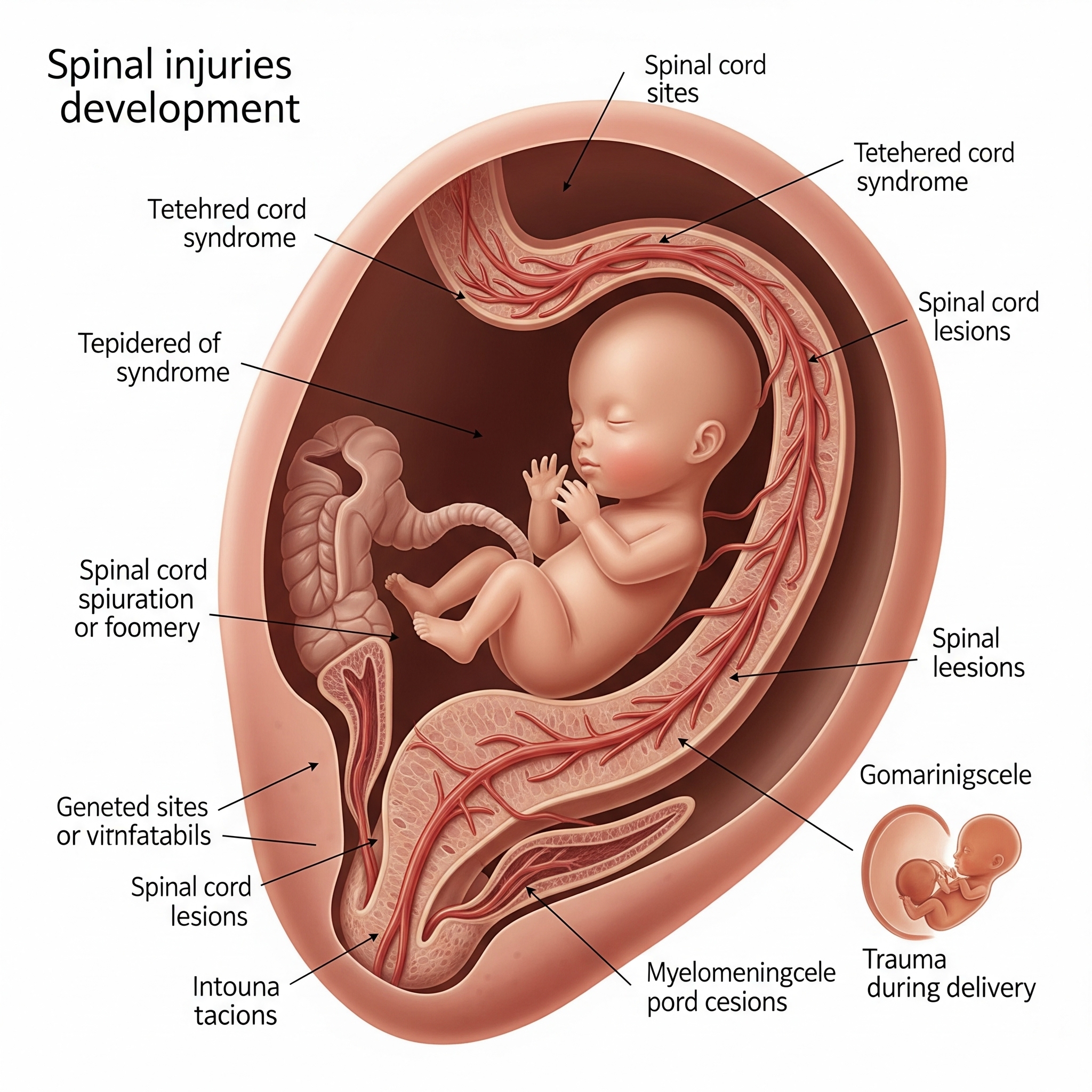A Spinal Cord Injuries Birth may cause represents one of the most severe and life-altering types of birth trauma. Damage to the spinal cord during labor and delivery can lead to partial or complete paralysis, sensory loss, and a range of complex medical needs. For families facing such a profound diagnosis, understanding the causes and impact of Spinal Cord Injuries Birth may involve, and knowing when medical negligence could be a factor, is critical for pursuing legal recourse and securing necessary lifelong support.
What are Spinal Cord Injuries Birth Can Lead To?
Spinal Cord Injuries Birth may inflict occur when the spinal cord is stretched, compressed, or torn during the birthing process. The spinal cord, a vital bundle of nerves extending from the brain down the back, is responsible for transmitting signals between the brain and the rest of the body. Damage to this critical pathway can result in devastating neurological deficits, impacting movement, sensation, and organ function below the level of the injury. Spinal Cord Injuries at Birth such injuries are often preventable if proper medical care is provided.
Common Causes of Spinal Cord Injuries Birth May Involve
While rare, Spinal Cord Injuries Birth may result from specific complications or medical errors during delivery:
1. Excessive Traction or Stretching Spinal Cord Injuries at Birth
- Breech Delivery: When a baby is born feet-first or buttocks-first, there’s an increased risk of traction on the spinal cord during delivery, particularly if excessive pulling is applied to the baby’s feet or trunk.
- Shoulder Dystocia: In cases where the baby’s shoulder gets stuck behind the mother’s pubic bone, excessive force applied to free the baby can stretch or injure the neck and spinal cord, similar to the mechanisms seen in Erb’s Palsy Lawsuit cases.
2. Improper Use of Delivery Tools
- Forceps or Vacuum Extractors: Misapplication or excessive force with these instruments can cause trauma to the baby’s head, neck, and spinal column.
3. Hyperextension of the Neck
- If the baby’s head is hyperextended (bent too far backward) during delivery, especially in breech presentations, it can put undue stress on the cervical (neck) spinal cord.
4. Delayed C-Section
- Failure to perform a timely Cesarean section when complications arise (e.g., prolonged labor, fetal distress, or specific presentations) can lead to prolonged stress on the baby, potentially increasing the risk of Spinal Cord Injuries at Birth may cause.
These situations often point to a deviation from the accepted standard of care, which forms the basis for a birth injury claim.
The Lifelong Impact of Spinal Cord Injuries Birth Can Inflict
The impact of Spinal Cord Injuries Birth may involve depends on the location and severity of the damage:
- Paralysis: Ranging from partial weakness to complete paralysis below the injury site.
- Sensory Loss: Diminished or absent sensation.
- Autonomic Dysfunction: Problems with bladder and bowel control, respiration, blood pressure regulation, and body temperature.
- Secondary Complications: Pressure sores, respiratory infections, and muscle contractures.
Lifelong long-term birth injury care, extensive therapies, and specialized equipment are typically required, making financial compensation through a birth injury lawsuit crucial for families. This highlights the importance of Life Care Planning Birth Injury survivors often need.
Seeking Legal Recourse for Spinal Cord Injuries Birth Negligence
If your child suffered Spinal Cord Injuries Birth due to suspected medical negligence, you may have grounds for legal action. An experienced birth injury lawyer will meticulously investigate your case by:
- Reviewing Medical Records Birth Injury Claim elements, including fetal monitoring strips and delivery notes, to pinpoint signs of improper care.
- Consulting with Expert Witnesses Birth Injury Lawsuits require, such as obstetricians, neurosurgeons, and life care planners, to establish causation and quantify damages.
Understanding the statute of limitations for birth injury claims is vital for pursuing justice for Spinal Cord Injuries Birth may involve.
If you want to call us and book a free call to discuss Spinal Cord Injuries Birth may cause and your legal options, contact here: Contact Trusted Birth Injury Lawyers | CPFamilyHelp
Frequently Asked Questions (FAQ) about Spinal Cord Injuries Birth
Are Spinal Cord Injuries Birth can cause always permanent?
The permanency of Spinal Cord Injuries Birth may cause depends on the severity and specific location of the damage. Some mild injuries may see partial recovery with intensive therapy, but many severe injuries result in lifelong impairment.
How are Spinal Cord Injuries Birth sustained diagnosed?
Diagnosis typically involves physical examination, neurological assessments, and imaging studies like MRI, which can visualize the spinal cord and identify damage. This is a crucial step in assessing Spinal Cord Injuries Birth.
Can a Cesarean section prevent Spinal Cord Injuries Birth?
In some high-risk situations, such as certain breech presentations, a timely C-section can be a critical birth injury prevention strategy to avoid trauma and Spinal Cord Injuries Birth might otherwise cause.
What types of compensation are available for Spinal Cord Injuries Birth claims?
Compensation typically covers past and future medical expenses, therapies, specialized equipment, home modifications, lost earning capacity, pain and suffering, and the cost of Life Care Planning Birth Injury survivors need. This influences the overall birth injury claim value.
What is the role of rehabilitation in Spinal Cord Injuries Birth?
Rehabilitation, including physical and occupational therapy, is critical for individuals with Spinal Cord Injuries Birth to maximize functional independence, manage complications, and adapt to their condition throughout their lives.





